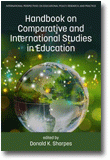
Handbook on Comparative and International Studies in Education
Edited by:
Donald K. Sharpes, Arizona State University
A volume in the series: International Perspectives on Educational Policy, Research and Practice. Editor(s): Peter Moyi, University of South Carolina. Supriya Baily, George Mason University. Ayesha Khurshid, Florida State University.
Published 2016
This Handbook is a comprehensive reference book for libraries, scholars, and comparative and international studies researchers. It contains 33 chapters on all major educational topics, including research using all qualitative and quantitative methodologies, with research from 23 countries and all inhabited continents. Here you as a scholar will find research from countries not usually known for published educational schooling topics. The globalization of educational research has not typically kept pace with the globalization of economies or communication technologies. This Handbook includes expanded research capabilities from both developed and less developed countries throughout the world.
CONTENTS
Preface. SECTION I: TESTING AND ACCOUNTABILITY MEASURES. International and Interstate Analyses of Student‐ and School‐Targeted Accountability Policy Effects, Jaekyung Lee and Laura C. Amo. International Test Rankings and Student Academic Performance: It’s the Economy Stupid, Christopher H. Tienken and Thomas W. Tramaglini. Comparative Indicators of Education in G20 Countries, Maria Stephens and Yemurai Tsokodayi. Evaluating Teachers through Student Test Scores: A Cautionary Tale, David C. Berliner. SECTION II: CROSS‐CULTURAL AND CROSS‐NATIONAL RESEARCH Cultural‐Bound Elements of Ethical Sensitivity: Case Studies from the Netherlands, Finland, and Iran, E. Kuusisto, K. Gholami, I. W. Schutte, M. V. C. Wolfensberger, and Kirsi Tirri. Criteria for Cross‐Cultural Survey Research, S. A. O’Connor‐Petruso and M. Martinez‐Pons. The Visual Turn in Comparative and International Education Research, Constantin Schreiber and Gustavo E. Fischman. Nordisk Education—A Question of Perspective? Lotte Rahbek Schou. Quality Education in Sub‐Saharan Africa, Sarah Lange. Adolescent Self‐Concept among Chinese, Kazakh, Americans, and Native Americans, Donald K. Sharpes. The Impact of International Student Teaching on Prospective U.S. Teachers: Cultural, Professional and Character Development across Five Countries, Binbin Jiang, Robert A. DeVillar, and Lauren M. Drake. Deconfessionalizing Religious Education in Post‐Secular Western Societies: Where Is it Done and Why Is it Important? Patrick Loobuyck. The Psychology of Muslim Suicide Bombers, Donald K. Sharpes. SECTION III: STRUCTURED EDUCATIONAL CONTEXTS: LEADERSHIP AND CURRICULUM. A Study of Fourth Grade Mathematics Content Between the Brazilian National Education Test and the Curriculum of the State of Sao Paulo, Ivanete M. Araldi Maciente. Physical School Environment as a Factor of Learning, Majda Cencic. Does Violence Beget Violence? The Relationship Between Exposure to Electoral Violence and Aggression Among Zimbabwean Youth, Angellar Manguvo. Perspectives, Dilemmas, and Multicultural Leadership of Public School Principals in the Three Southern Border Provinces of Thailand, Ekkarin Sungtong. Quality in Higher Education: Global Convergence and the Case of China, Ji Zhou. Educational Community Networking in Belarus, Iouri Zagoumennov, Nikolai Gorbachev, and Sergei Malchenko. Globalization as Challenge for Education and “Bildung”: Analyzing the Impetus of Global Education as International Imperative in German Schools, Claudia Bergmüller. Educational Leadership in Romanian High Schools: Evidence from Teachers and Principals, Ioana Sonia Ilie. SECTION IV: TEACHERS, PARENTS AND STUDENTS. The Education of Ethnic Minorities in The People’s Republic of China, Ming Fang He and Min Yu. Improving Educational Achievement for Marginalized Children in Rural Bangladesh via Non‐formal Education, Kevin A. Gee, Talat Mahmud, Kazi Saleh Ahmed, and Elizabeth Pearce. Finnish Teachers and Diversity: The Case of Muslim Students, K. Tirri, I. Rissanen, and E. Kuusisto. Exploring Gender Differences and Developmental Changes in Japanese Adolescent and Young Adult Self‐Concept, Patrick Pieng, Yukari Okamoto, and Jonna R. La Joy. Raising Only Children in Urban China: Do Parents Hold Gender‐Differentiated Expectations? Yandong Liang, Yukari Okamoto, and Mary E. Brenner. Parent Involvement and Student Academic Achievement in Taiwan: Gender, Mediational, and Developmental Considerations, Hsiu‐Zu Ho, Kuang‐Hui Yeh, Chih‐Wen Wu, Yeana W. Lam, Yin Yu, and Hsin‐Yi Kung. Understanding International Korean, Vietnamese and Chinese Students’ Motivations to Study Overseas, Ly Thi Tran and Nhai Thi Nguyen. The Challenges of Promoting Cultural Responsiveness: Teachers’ Cultural Knowledge and Multicultural Competency in Hong Kong Schools, Ming‐Tak Hue. Shifting Perspectives and Pedagogies: The Impact of Student Teaching Abroad, Tine Falk Sloan, Hsiu‐Zu Ho, Elizabeth Sciaky, and Kara Otto. Similarities in Perceptions of Pedagogical Expertise by Turkish and American Students, Nuray Senemoglu.
-
Paperback9781681236766
Web price: $51.00 (Reg. 60.00)
-
Hardcover9781681236773
Web price: $87.98 (Reg. 103.50)
- eBook9781681236780

- EDU000000 - EDUCATION: General
- EDU020000 - EDUCATION: Multicultural Education
- EDU040000 - EDUCATION: Philosophy & Social Aspects
-
 Educational Restructuring
International Perspectives on Traveling Policies
Educational Restructuring
International Perspectives on Traveling Policies
-
 Emerging International Issues in Student Affairs Research and Practice
Emerging International Issues in Student Affairs Research and Practice
-
 Immigrant Youth Who Excel
Globalization's Uncelebrated Heroes
Immigrant Youth Who Excel
Globalization's Uncelebrated Heroes
-
 International Perspectives on Bilingual Education
Policy, Practice, and Controversy
International Perspectives on Bilingual Education
Policy, Practice, and Controversy
-
 Keep Calm, Teach On
Education Responding to a Pandemic
Keep Calm, Teach On
Education Responding to a Pandemic
-
 Lost in Transition
Redefining Students and Universities in the Contemporary Kyrgyz Republic
Lost in Transition
Redefining Students and Universities in the Contemporary Kyrgyz Republic
-
 Surviving the Transition? Case Studies of Schools and Schooling in the Kyrgyz Re
Surviving the Transition? Case Studies of Schools and Schooling in the Kyrgyz Re

